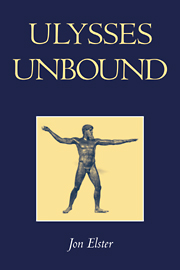Preface and Acknowledgments
Published online by Cambridge University Press: 07 December 2009
Summary
The title essay of Ulysses and the Sirens (1979, rev. ed. 1984) was a discussion of precommitment or self-binding, in which I tried to characterize the concept and illustrate it with examples from various domains of human (and animal) behavior. In the present volume I take a fresh look at the question.
In Chapter I, I make a stab at a more systematic analysis than the one I provided in the earlier treatment. The main analytical idea is a distinction between reasons for precommitment and devices for precommitment. As it turns out, some of the phenomena I discuss appear both as reasons and as devices. People may precommit themselves against anger, but also precommit themselves to anger to get their way.
Chapter II reflects a change in my views about constitutions as precommitment devices. I have been much influenced by a critical comment on Ulysses and the Sirens by my friend and mentor, the late Norwegian historian Jens Arup Seip: “In politics, people never try to bind themselves, only to bind others.” Although that statement is too stark, I now think it closer to the truth than the view that self-binding is the essence of constitution-making. Ulysses bound himself to the mast, but he also put wax in the ears of the rowers.
- Type
- Chapter
- Information
- Ulysses UnboundStudies in Rationality, Precommitment, and Constraints, pp. ix - xiiPublisher: Cambridge University PressPrint publication year: 2000
- 1
- Cited by



